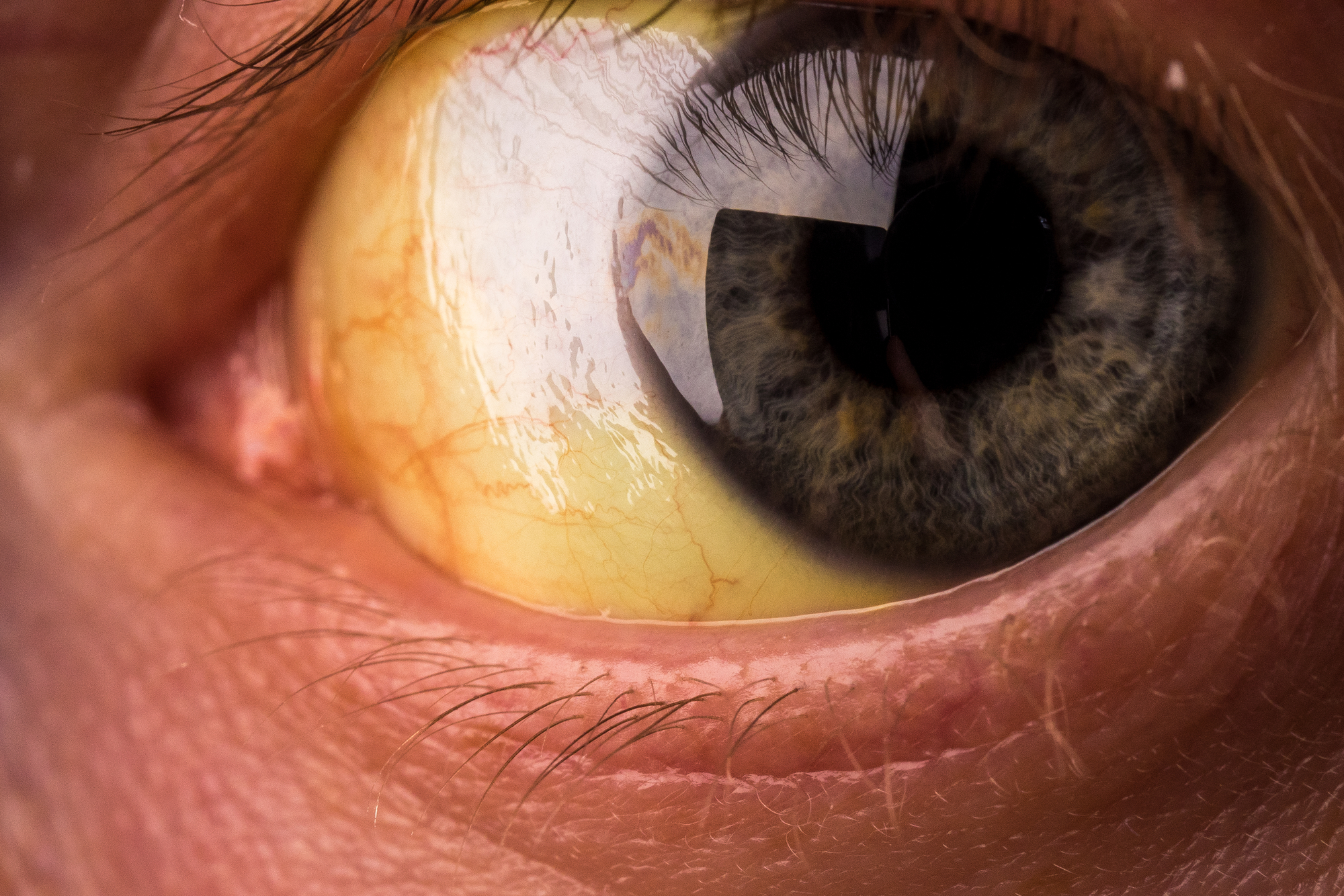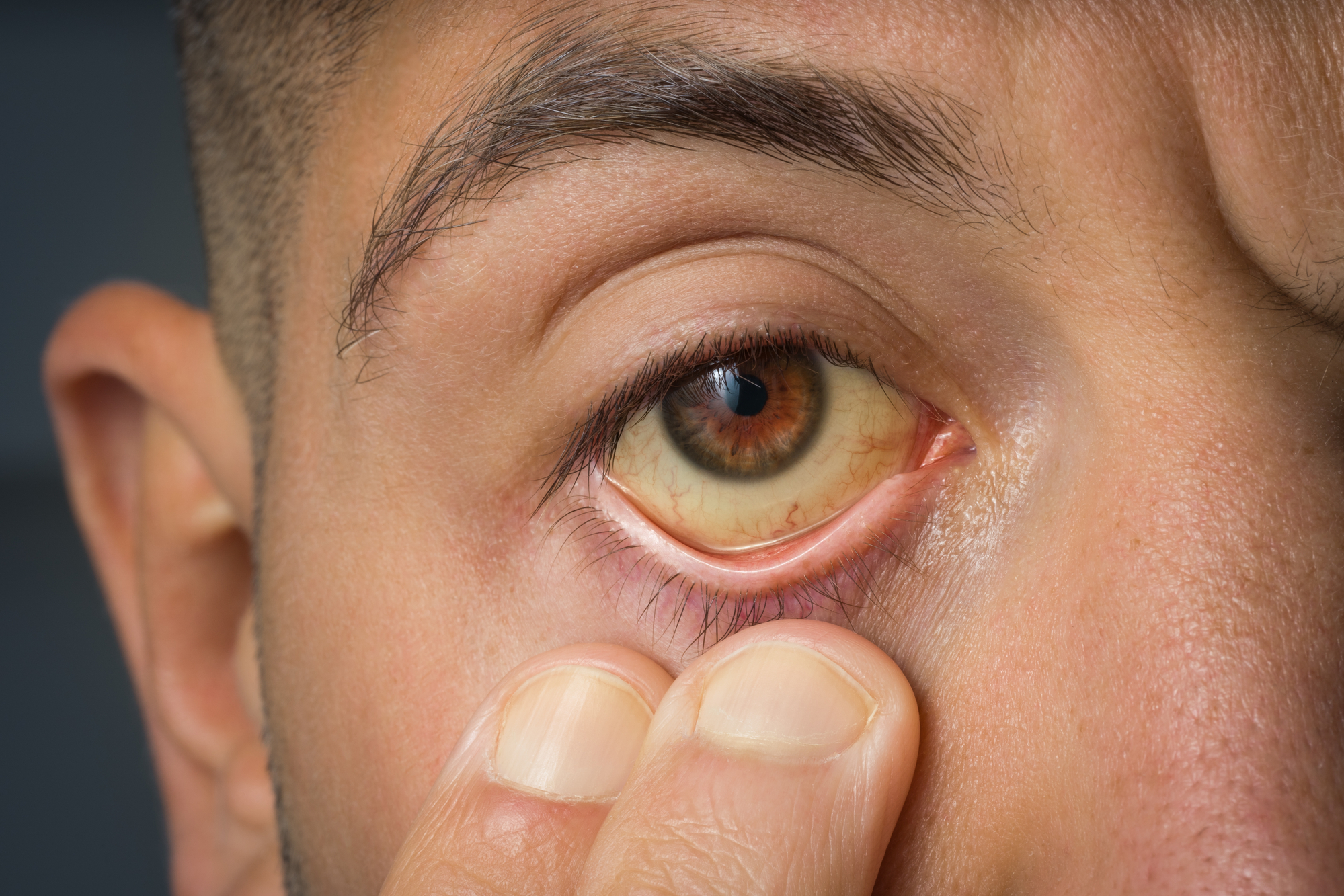Updated on December 20, 2024
The Yellowing of the Eyes: What is Scleral Icterus?


Vision Center is funded by our readers. We may earn commissions if you purchase something via one of our links.
Different underlying medical conditions can cause scleral icterus. In this article, we'll explore why seeking timely medical intervention is crucial when this is observed.


What is Scleral Icterus?
Scleral icterus itself isn't a disease but rather a symptom of an underlying condition. Often, it's an early indicator of jaundice, which can be caused by various health issues, including:
- Liver diseases. Hepatitis, cirrhosis, and liver cancer can impair the liver's ability to process bilirubin, leading to its buildup in the bloodstream and causing yellow eyes.
- Bile duct obstruction. Gallstones, tumors, or inflammation can block the bile ducts, preventing the proper excretion of bilirubin.
- Hemolytic anemia. This condition involves the excessive breakdown of red blood cells, overwhelming the liver's capacity to process bilirubin.
What Causes Scleral Icterus?
Scleral icterus is caused by excess bilirubin, a yellow pigment produced during the normal breakdown of red blood cells. The liver is responsible for processing and excreting bilirubin from the body. That’s why liver problems are the most common cause of the condition.
However, sometimes, a person may just have prominent subconjunctival fat that results in a yellow hue in the eyes. There are cases where doctors misdiagnose this for scleral icterus.
A distinguishing feature of scleral icterus is that jaundice also affects the area near the cornea. Scleral icterus could represent the only sign of jaundice on physical examination in people with dark skin.
Does Scleral Icterus Have Other Symptoms?
Scleral icterus will not cause symptoms. Rather, symptoms are related to the underlying cause of jaundice.
Possible symptoms you may have with scleral icterus include:
- Itchy skin
- Joint aches
- Fullness in the stomach
- Fatigue
- Malaise
- Fever
- Changes in urine or stool
- Appetite loss
- Nausea
- Sudden weight loss
When to See a Doctor
We recommend speaking with your healthcare provider if you experience scleral icterus or jaundice symptoms. While the condition sometimes doesn't require treatment, your doctor can diagnose your condition and rule out any possible health problems.
Scleral icterus often occurs when your bilirubin levels are between 2 to 3 mg/dL. This does not mean your skin or other mucous membranes have also become yellow.
What Happens if Scleral Icterus is Untreated?
Scleral icterus itself isn't a disease but rather a symptom of an underlying condition. If left untreated, these underlying conditions can lead to serious complications, such as:
- Liver failure. Progressive liver damage can impair its essential functions, leading to life-threatening complications.
- Infections. Obstructed bile ducts can become infected, causing cholangitis, a serious condition.
- Nutritional deficiencies. Impaired liver function can hinder the absorption of essential nutrients.
Treatment options will depend on the underlying eye diseases or health problems causing the yellowing of the eyes and/or skin.
The prognosis of scleral icterus or jaundice varies based on the cause. For example, jaundice due to the resorption of hematomas or Gilbert syndrome will have a better prognosis than malignant biliary obstructions and liver cirrhosis.
Diagnostic Procedures for Underlying Conditions
If you present with scleral icterus, your doctor will likely recommend several diagnostic tests to identify the underlying cause:
- Blood tests. Liver function tests, bilirubin levels, and complete blood count can provide valuable information about liver health and red blood cell breakdown.
- Imaging studies. Ultrasound, CT scans, or MRI can help visualize the liver, bile ducts, and surrounding organs to identify any abnormalities.
- Liver biopsy. In some cases, a small tissue sample from the liver may be examined under a microscope to assess liver damage or disease.
Be prepared to discuss your medical history, lifestyle habits, and any medications you're taking with your doctor to aid in the diagnostic process.
Listen In Q&A Format
The Yellowing Of The Eyes: What Is Scleral Icterus
Vision Center Podcast
Preventive Measures and Lifestyle Changes to Consider
While some causes of scleral icterus, like genetic conditions, are unavoidable, certain lifestyle choices can promote liver health and reduce your risk:
- Maintain a healthy weight. Obesity increases the risk of fatty liver disease and other liver-related complications.
- Limit alcohol consumption. Excessive alcohol intake can damage liver cells and lead to liver disease.
- Get vaccinated. Vaccinations are available for hepatitis A and B, which can cause liver damage.
- Practice safe sex. Hepatitis B and C can be transmitted through sexual contact.
- Avoid sharing needles. Sharing needles increases the risk of contracting hepatitis B and C.
By understanding the potential health implications of untreated scleral icterus, undergoing appropriate diagnostic tests, and adopting preventive measures, you can take proactive steps to protect your liver health and overall well-being.
In this article
5 sources cited
Updated on December 20, 2024
Updated on December 20, 2024
About Our Contributors
Anthony Armenta, a graduate in International Relations from the University of California, Irvine, has dedicated the past 5 years to freelance health content writing and medical editing in Barcelona. Working with public hospitals, he covers various medical specialties, including infectious diseases and pneumology. Anthony's commitment to creating fact-driven, health-related content is driven by his belief in the power of information to empower individuals to improve their health, including in areas like vision care.
Dr. Melody Huang is an optometrist and freelance health writer with a passion for educating people about eye health. With her unique blend of clinical expertise and writing skills, Dr. Huang seeks to guide individuals towards healthier and happier lives. Her interests extend to Eastern medicine and integrative healthcare approaches. Outside of work, she enjoys exploring new skincare products, experimenting with food recipes, and spending time with her adopted cats.

